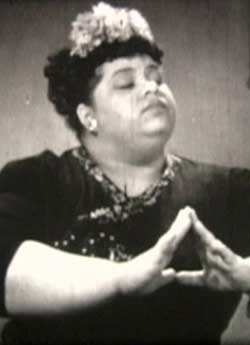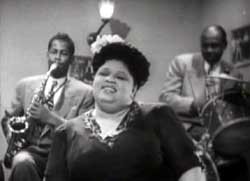 A jump-blues tune Hey Lawdy Mama (1944) gets a swing-jazz treatmen by the voice of June Richmond, backed up by the Roy Milton sextet. She'd recorded this film on lacquer a couple years earlier, but this is a fresh new version.
A jump-blues tune Hey Lawdy Mama (1944) gets a swing-jazz treatmen by the voice of June Richmond, backed up by the Roy Milton sextet. She'd recorded this film on lacquer a couple years earlier, but this is a fresh new version.
"Oh lawdy mama, hey lawdy mama/ Meet me in the bottom, bring my boots & shoes/ Oh lawdy mama, hey lawdy mama me in the bottom, bring my boots & shoes/ I've got to leave the south, ain't got no time to lose.
"My man don't love me/ Treats me awfully mean/ Oh lawdy mama, hey lawdy mama/ My man don't love me/ Treats me awfully mean/ He's the meanest man you have ever seen."
Sax & trumpet solos quickly decorate the instrumental break, then June does another verse, then there are sax & drum solos connecting to the next verses. Toward the end, June does a few pleasant dance moves, surprisingly graceful given her size. And as always from June, great voice.
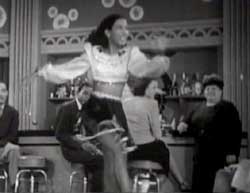 A handsome & perhaps just slightly seedy tall slim dandy arrives at a club & it takes a whole gaggle of beautiful hatcheck girls to take this man's hat. He the titular character Mr. Jackson of Jacsonville (1945).
A handsome & perhaps just slightly seedy tall slim dandy arrives at a club & it takes a whole gaggle of beautiful hatcheck girls to take this man's hat. He the titular character Mr. Jackson of Jacsonville (1945).
As he strides into the room we hear June Richmand singing with her fine swing-jazz voice: "Who's that guy the gals all go for?/ Pawn their rings & spend their dough for?/ Hardest playboy on the hill/ Mr. Jackson from Jacksonville/
"With his hair all slick & greasy/ Makes the chicks fall oh so easy/ Always smart & dressed to kill/ Mr. Jackson from Jacksonville/
"The other cats don't stand a chance/ Whever he's around/ Cuz when it comes to real romance/ He really puts it down/
"Say, he's got a lot of jive that's groovy/ Comes on like a wild west movie/ Guaranteed to give a thrill/ Mr. Jackson from Jacksonville."
At the instrumental break a tall gangly beauty dances center stage & puts on quite a show of her own. She has much more of a boyish figure than is usual for dancing girls.
She's followed by a dance couple & June provides an extended scat behind them. They dance off-stage & June takes up some of the lyrics anew for the close. A very fine & lively soundie!
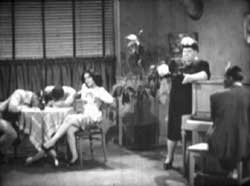 Here's a fun little soundie which stars the great vocalist June Richmond, who sang for Count Basie but took the latter part of her career to Europe & never returned to the States.
Here's a fun little soundie which stars the great vocalist June Richmond, who sang for Count Basie but took the latter part of her career to Europe & never returned to the States.
Who Dunit to Who (1946) opens with a club scene wherein twin brothers, with the family name of Who, are seated with a gal at a table. With comic unrealism, the twins shoot each other in the head, slump over the table, & remain there while June Richmond never misses a beat, nor does the girl sitting at the table with the dead guys seem much to care.
The song itself is no great shakes though June makes it as good as it can be. It was written by Elliot Daxe, Al Haas & Mike Durso, conceivably as a soundies original:
"Once there were two brothers/ By the name of Who/ They both loved Lil & shot to kill/ Who dunit to Who./ The sheriff came a runnin'/ Looking for a clue/ He shook his head & gravely said/ Who dunit to Who./ Who dunit? Who dunit? Who dunit? Who-hooo?
"He questioned Pete the Injun/ Cuz he thought he knew/ He shrugged & said him shot him dead/ Who dunit to head./ Then up jumps Bill the bar man/ Cuz the bill was due/ But they were dead, shot through the head/ Who dunit to who./ Who dunit? Who dunit? Who dunit? Who-hooo?"
Throughout, June leans on the piano, at which a pianist is seated. Characters like Pete the Injun & the Sheriff are acted out, though Pete's just another black guy, not an Indian.
"The sheriff got disgusted/ Said that he was through/ To save his face he quit the case/ Who dunit to Who./ Now up high on a hilltop/ One tombstone for two/ Says 'They loved Lil & shot to kill'/ Oh, Who dunit to Who/ Who dunit, who-oo."
As an extended jest, this is an amusing soundie that everyone acts out well enough. But with a great voice like June's, I couldn't help but want a better song.
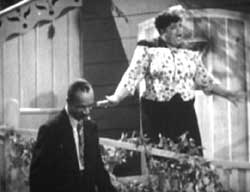 I just love June Richmond, the singer for the slightly bluesy swing-number Time Takes Care of Everything (1946). She a big, big woman, but carries herself with sex appeal, an appeal that's amplified by that gorgeous voice.
I just love June Richmond, the singer for the slightly bluesy swing-number Time Takes Care of Everything (1946). She a big, big woman, but carries herself with sex appeal, an appeal that's amplified by that gorgeous voice.
She's shown on a set that creates a veranda of a cottag. From that veranda she gazes down on a fellow who seems to have been an unfaithful lover. She sings to him:
"I guess you think you are pretty smart/ Fooled me it's true/ But time takes care of everything/ And time will take care of you./ You can break the best of hearts/ Leave them when they're blue/ But time takes care of everything/ And time will take care of you..."
As she sings, the guy seems rather callously amused, but in the end when she walks away, he looks alarmed that she really is breaking up with him.
For more about this great singer, see the review of her performance in the Louis Jordan feature film Reet, Petite, & Gone (1946).
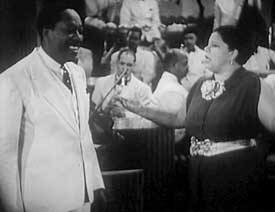 Les Hite & His Orchestra did not record all that much music, but by being handy & available around the Los Angeles area, they managed to get into movies without first having to be a popular band. Les Hite & His Orchestra did not record all that much music, but by being handy & available around the Los Angeles area, they managed to get into movies without first having to be a popular band.
The real thrill of the music-short Murder in Swingtime (1937) is not the reasonably good orchestra, but their spectacular large-sized singer June Richmond who belts out the number "What's Music Got?"
The lyrics begin: "What's music got that I haven't got?/ You're always listening to the radio."
For more on June, see the review of the Louis Jordan film Reet, Petite & Gone (1946), her last film before heading off to Europe for the rest of her career.
As a comedy short it's getting to be about time for something funny. Tapdancers in white tuxes add some flash & individuals in the Les Hite Band begin to catch our attention, as something's going on.
After June's number, there's a Les Hite arrangement of "Dinah," during which one of the band members, Piccolo Pete, gets bonked on the head.
He passes out into a dream of a jury trial, in which he's accused of having murdered Dinah. One by one his bandmates take the stand & give musical evidence against him. The judge raps in rhyme between licks.
Piccolo Pete is found guilty & told his punishment is to swing. Instead of swinging from the gallows, however, he goes front center of the band to swing his solo. An amusing wee film overall.
copyright © by Paghat the Ratgirl
|
